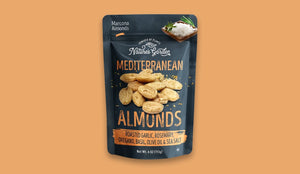When it comes to healthy eating, the Mediterranean diet has stood the test of time. Renowned for its delectable flavors and numerous health benefits, this dietary approach has captured the hearts and taste buds of people worldwide.
Including us here at Nature’s Garden! (But more on that later!)
The Roots of The Mediterranean Diet
The roots of the Mediterranean diet can be traced back thousands of years to the ancient civilizations that flourished around the Mediterranean Sea. In countries such as Turkey, Greece, Italy, Egypt, and Spain, the local populations relied heavily on the bountiful offerings of the land and sea. Their diets revolved around fresh, unprocessed foods that were readily available, including fruits, vegetables, whole grains, legumes, olive oil, fish, and herbs.
The term "Mediterranean diet" was coined in the 20th century when health professionals and researchers began to take notice of the exceptional health and longevity of the Mediterranean region's inhabitants.
How was it that these folks were living longer, healthier lives?
The Seven Countries Study, initiated by Ancel Keys in the 1950s, played a crucial role in highlighting the benefits of this diet. The study revealed that people in Mediterranean countries experienced lower rates of heart disease and certain cancers compared to those in other regions, mainly attributed to their dietary choices.
What Makes up a Mediterranean Diet?
Abundance of Plant-Based Foods
The Mediterranean diet places a strong emphasis on plant-based foods like fruits, vegetables, whole grains, legumes, nuts, and seeds. These nutrient-dense components are packed with vitamins, minerals, antioxidants, and fiber, promoting overall health and well-being.
All The Healthy Fats
Olive oil, a quintessential element of the Mediterranean diet, is rich in monounsaturated fats, which are known to support heart health. Olives and avocados are other sources of healthy fats that feature prominently in this eating style.
Just A Little Fish and Poultry
Fish, especially fatty fish like salmon and sardines, are a prominent protein source in the Mediterranean diet. Poultry is also consumed in moderation, with an emphasis on lean cuts and skinless preparation.
Limited Red Meat and Sweets
Red meat is consumed sparingly in the Mediterranean diet, with meals often featuring smaller portions. Sweets and sugary treats are considered occasional indulgences rather than everyday staples.
Herbs, Spices, and Flavorful Seasonings
Mediterranean cuisine is renowned for its aromatic herbs, spices, and seasonings, such as garlic, basil, oregano, rosemary, and thyme. These natural flavor enhancers add depth and complexity to dishes, reducing the need for excessive salt or unhealthy additives.
But the Mediterranean diet's health benefits extend far beyond its lip-smacking flavors. Numerous scientific studies say the diet may help to reduce risk of chronic diseases, including heart disease, type 2 diabetes, certain cancers, and cognitive decline. It is believed that the combination of antioxidant-rich foods, healthy fats, and an abundance of fruits and vegetables contribute to these positive outcomes.

Introducing Nature’s Garden Mediterranean Almonds – the ultimate summer snack.
While dropping everything and going full-Mediterranean might seem like a far stretch this summer, we’ve created a new snack that allows you to experience the flavors of the Mediterranean.
This healthier-for-you alternative is a fun and easy way to sink your teeth into those renowned herbs, spices, and seasonings, without any of the guilt. We’re proud to be here to help you snack a little smarter this summer.
The unique flavors of roasted garlic, basil, oregano, rosemary, paprika, and sea salt come together in Nature's Garden Mediterranean Almonds, providing an instant escape to the shores of the Mediterranean. These almonds are coated in a seasoning blend that captures the essence of the Mediterranean, making them a delicious and satisfying snack choice.
Summer Snacking Made Easy
Summer is synonymous with outdoor adventures and busy schedules. It's important to have convenient and nutritious snacks that support your on-the-go lifestyle. Nature's Garden Mediterranean Almonds come in individual 4 oz snack packs, making them an ideal companion wherever your summer takes you. Whether you're headed to the office, embarking on a hike, or simply relaxing by the pool, these almonds are a satisfying and energizing snack choice. Additionally, their Mediterranean-inspired flavors provide a delightful twist that will transport you to sun-kissed landscapes with every bite.
This summer, embrace the Mediterranean diet and its delectable flavors by incorporating Nature's Garden Mediterranean Almonds into your snacking routine. With their vibrant seasoning and a perfect blend of wholesome ingredients, these almonds offer a vacation for your taste buds while nourishing your body.
Enjoy them straight from the pack, sprinkle them on salads, or include them on charcuterie boards for a burst of flavor. Nature's Garden Mediterranean Almonds allow you to indulge guilt-free, savoring the benefits of the Mediterranean diet wherever you go.
Give into the allure of the Mediterranean and let these almonds take you on a mouthwatering journey of heart health and decadent snacking.
A big shoutout to our friends at the American Heart Association and John Hopkins Medicine for the information used in this article. Note that this blog post provides a general overview of the history of the Mediterranean diet and its cultural significance. For in-depth and accurate information, it is recommended to consult with a healthcare professional.

















